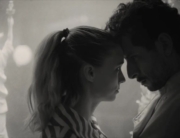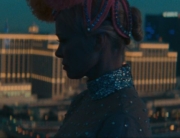
“You suck.”
“You’re stupid.”
“This will ruin your career.”
Even the most confident among us hear those nagging voices at the worst possible moments. Justine Bateman’s directorial debut Violet opens up the inner life of a beautiful Hollywood executive (Olivia Munn) struggling to ignore the sneering taunts, shore up her self-esteem, and claim the success she (of course, this being Hollywood) deserves. It’s an intriguing idea that pedestrian writing and Violet’s Los Angeles-by-numbers predicaments prevent from connecting except in a generic way.
Violet makes a strong impression in its first few moments by allowing us into Violet’s troubled head. A harsh, tense voice (Justin Theroux’s) tells her she’s a loser and fool as disturbing images of car crashes and rotting animals flash on the screen. Violet telegraphs responses via her onscreen cursive handwriting over red-tinted images, and she tries either to meekly talk back or muse over a better future (“Why can’t I just be happy?”). This initially bracing setup runs out of punch early on because it is repetitive and the insults directed toward her don’t seem to be tailored with any malicious skill—they could be thrown at anybody. Likewise, Violet’s answers lack any defining personality. Perhaps director Bateman is setting up Violet as a sort of Everywoman, a victim of men’s ceaseless negging.
Well, she sure doesn’t feel like Everywoman. Violet is gorgeous, although self-absorbed and not a very good friend to a loyal, happier pal (Erica Ash). Facing sexism of the 1980s 9 to 5 type at the thriving production company where she works as a high-profile executive, she talks back to her sexist boss with the pluck of an American Girl doll, gets fired, then immediately lands a better job and falls into an affair with the bland, lovestruck hunk whose house she’s been sharing. Sorry about the inner torment, but cry me a river.
To the film’s advantage, Munn’s performance is disarmingly sensitive and vulnerable. You don’t know whether you feel worse for relatively privileged Violet or for poor Munn, valiantly struggling with the script to fill out her character and make her someone whose troubles are worth getting worked up about.
Ultimately, Violet falls into a jaded movie industry headspace by tut-tutting Hollywood as a soulless, sexist place while eagerly egging on Violet as she climbs the ladder. Violet’s act of defiance against the inner voice—blowing off her mean mother’s funeral—is portrayed as an act of courage. Yet what does Violet do instead of burying Mom? Hang out poolside with vapid wannabes talking shop. Violet has pulled off a real trick: making symptoms of heavy mental illness go away through improved self-esteem. Now that the mean voices inside her head are gone, she’s liberated to be as careerist and pleased with herself like all the other showbiz thirsties. Oh, Violet. A little original thought would have gone a long way to truly set you free.
















Leave A Comment